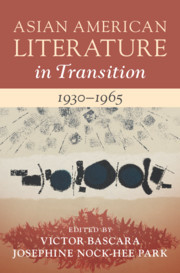Description
Asian American Literature in Transition, 1930-1965: Volume 2
Asian American Literature in Transition Series
Coordinators: Bascara Victor, Park Josephine Nock-Hee
Language: English
Publication date: 06-2021
396 p. · 15.8x23.5 cm · Hardback
396 p. · 15.8x23.5 cm · Hardback
Description
/li>Contents
/li>Biography
/li>
This volume is devoted to Asian American Literature between 1930 to 1965, a period of immense social, historical, and cultural transformations that continue to shape the conditions of our world. From the Great Depression to the Second World War to the Civil Rights Movement to landmark immigrations reforms, Asian American literature provides unique and insightful perspectives on these historical developments, all while creatively engaging with globally-dispersed decolonization movements. Each chapter, written a by leading figures in their fields, demonstrates how Asian American writing affectingly reveals our complex world and its contested pasts. Case studies of major authors of this era show this as a time when the figure of the Asian American author became newly significant. This volume provides historical grounding, theoretical interventions, and nuanced textual analysis of Asian American literature in this period.
Editors' introduction; Part I. Transitions Approached through Concepts and History: 1. The popular front and Asiatic modes of cultural production Steven Lee; 2. Asian American realism Arnold Pan; 3. On modernism, decolonization, and Asian American literature in transition Victor Bascara; 4. The cultures of Japanese internment: a short history of 'funny' turns Caroline Chung Simpson; 5. The 1947 partition, war, and internment: hidden histories of migration and displacement in transnational Asia Kavita Daiya; 6. Cold War fiction: the flower drum song's political education Josephine Nock-Hee Park; 7. Desert, island, ocean, swamp: Cold War ecologies and the Asian American environment Erin Suzuki; Part II. Transitions Approached through Authors, Texts, Concepts, and History: 8. Lin Yutang and the invention of Asian America, 1949 Richard Jean So; 9. H. T. Tsiang against the world Hua Hsu; 10. 'A congressman from India': Dalip Singh Saund in Cold War America Manan Desai; 11. Younghill Kang, transpacific agent David Roh; 12. Transition and obliteration: Jose Garcia Villa in the United States Jonathan Chua; 13. America is in the heart as postcolonial pastoral: an ecocritical case study of Carlos Bulosan Sarah D. Wald; 14. Bienvenido Santos: writing the interstitial spaces of Asian American literature Cynthia Tolentino; 15. Women writing war in Asia/America Sze Wei Ang; 16. Japanese incarceration, settler colonialism Sarah Dowling; 17. Jade Snow Wong and the making of model minority democracy Cindy I-Fen Cheng; 18. A little bit of form goes a long way: no-no boy and the ruse of empire Elda Tsou; 19. Richard Eun-kook Kim James Kyung-Jin Lee.
Victor Bascara is an associate professor of Asian American Studies at UCLA, where he has served as Chair of the Asian American Studies Department. He is a scholar and teacher of US ethnic and postcolonial studies, focusing on the critical study of US Empire. He is the author of Model Minority Imperialism (2006), on the editorial board of Amerasia Journal, and a co-editor of the Critical Refugee Studies book series at the University of California Press.
Josephine Nock-Hee Park is Professor of English and Director of the Asian American Studies Program at The University of Pennsylvania. She is the author of Apparitions of Asia: Modernist Form and Asian American Poetics (2008), which garnered the Literary Book Award from the Association for Asian American Studies, and Cold War Friendships: Korea, Vietnam, and Asian America (2016). She presently serves on the editorial boards of the Journal of Asian American Studies and Verge: Studies in Global Asias.
Josephine Nock-Hee Park is Professor of English and Director of the Asian American Studies Program at The University of Pennsylvania. She is the author of Apparitions of Asia: Modernist Form and Asian American Poetics (2008), which garnered the Literary Book Award from the Association for Asian American Studies, and Cold War Friendships: Korea, Vietnam, and Asian America (2016). She presently serves on the editorial boards of the Journal of Asian American Studies and Verge: Studies in Global Asias.
© 2024 LAVOISIER S.A.S.





